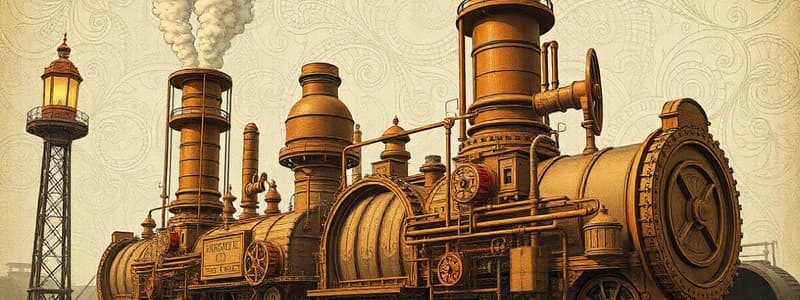Podcast
Questions and Answers
What was the original meaning of the term 'engine' in a military context?
What was the original meaning of the term 'engine' in a military context?
- Any device used in transportation
- A tool for scientific measurements
- A mechanical contraption used in war (correct)
- A type of communication system
Which scientist is credited with formulating the scientific method?
Which scientist is credited with formulating the scientific method?
- Nicolaus Copernicus
- Leonardo da Vinci
- Robert Boyle
- Galileo Galilei (correct)
What significant contribution did Thomas Newcomen make in the field of engineering?
What significant contribution did Thomas Newcomen make in the field of engineering?
- The calculus
- The first practical steam engine (correct)
- The first electric telegraph
- The theory of elasticity
Who was responsible for securing patents for an induction motor and AC system?
Who was responsible for securing patents for an induction motor and AC system?
Which of the following advancements is not listed among the challenges for engineering in the 21st century?
Which of the following advancements is not listed among the challenges for engineering in the 21st century?
What invention is Thomas Edison best known for?
What invention is Thomas Edison best known for?
Which significant contribution to energy generation uses water power?
Which significant contribution to energy generation uses water power?
What challenge involves improving urban environments?
What challenge involves improving urban environments?
Flashcards
Engine (historical definition)
Engine (historical definition)
A mechanical contraption used in war, such as a catapult.
Steam Engine
Steam Engine
The process of converting heat energy into mechanical energy.
Ohm's Law
Ohm's Law
The discovery of the relationship between electric current and potential difference in a conductor.
Hydroelectric Dam
Hydroelectric Dam
Signup and view all the flashcards
Nuclear Power Station
Nuclear Power Station
Signup and view all the flashcards
Transistor
Transistor
Signup and view all the flashcards
Integrated Circuit
Integrated Circuit
Signup and view all the flashcards
CPU (Central Processing Unit)
CPU (Central Processing Unit)
Signup and view all the flashcards
Study Notes
Historical Context of "Engine"
- Historically, "engine" referred to war machines, like catapults.
- The word itself comes from Latin ingenium, meaning clever invention or innate quality.
Key Figures and their Contributions
- Leonardo da Vinci: Conceptual designs and practical engineering works.
- Nicolaus Copernicus: Modern astronomy.
- Galileo: Scientific method of gaining knowledge.
- Robert Boyle: Compression and expansion of gases.
- Robert Hooke: Theory of elasticity.
- Sir Isaac Newton: Calculus, light and color, theory of gravitation.
- Thomas Newcomen: First practical steam engine.
Pre-20th Century Advancements in Engineering
- Transportation:
- Canal systems: Important during the Industrial Revolution (e.g., Rideau Canal).
- Road building: Essential for travel and trade.
- Steam engines and railroads: Significant impact (e.g., Pacific Railroad, Orient Express, Canadian Pacific).
- Manufacturing:
- Steam engines supported manufacturing, mining, transportation, and textiles.
- Mining:
- Steam engines facilitated mining operations.
- Electric Power:
- Volta: First electric battery.
- Ohm: Relationship between current and potential difference.
- Davy: Electromagnetism and the arc light.
- Faraday: Magnetic induction.
- Edison: Practical incandescent light bulb.
- Tesla: Induction motor and AC system.
- Westinghouse: Niagara hydroelectric project.
- Early Computer Systems/Communication:
- Schilling: First electric telegraph.
- Alexander Graham Bell: "Acoustic telegraph."
20th Century Advancements
- Hydroelectric dams
- Nuclear power stations
- Cars
- Write flier
- Transistor
- Integrated circuit
- First CPU
- Moore's Law
National Academy of Engineering Challenges for the 21st Century
- Make solar energy economical.
- Provide energy from fusion.
- Develop carbon sequestration methods.
- Manage the nitrogen cycle.
- Provide access to clean water.
- Restore and improve urban infrastructure.
- Advance health informatics.
- Engineer better medicines.
- Reverse-engineer the brain.
- Prevent nuclear terror.
- Secure cyberspace.
- Enhance virtual reality.
- Advance personalized learning.
- Engineer the tools of scientific discovery.
Studying That Suits You
Use AI to generate personalized quizzes and flashcards to suit your learning preferences.




